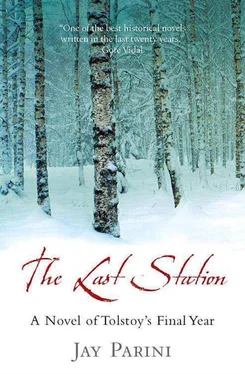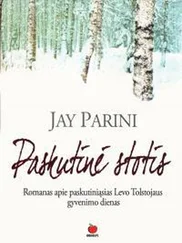One man asked for money, and I gave him some. Another asked, then a third, and soon the whole crowd besieged me. Disorder and a crush ensued. A porter from the next house shouted to the mob to get off the sidewalk, and they submissively obeyed his command. Organizers appeared among the crowd, and they took me under their protection. They hoped to extricate me from the crush, but the crowd, which at first had stretched in a line along the sidewalk, had gathered around me in a circle. They implored me with their looks, begging. Each face was more pitiful, more jaded, more degraded than the last. I gave away everything I had with me, which was not much, and followed the crowd into the Night-Lodging House.
It was an immense building, consisting of four stories. On the top story were the men’s lodgings and, on the lower stories, the women’s. First, I entered the women’s quarters: a big room filled with bunks, arranged in two tiers, above and below. Women old and young – bizarrely dressed, ragged, with no outdoor garments – entered and took possession of their bunks. Some of the older ones crossed themselves and prayed for the founder of this refuge. Others merely laughed and swore.
I went upstairs to the men’s lodging. Among them I saw a man whom I had just given money. Seeing him, I felt suddenly ashamed, dreadfully so, and hurried away. Feeling as if I had committed a crime, I left the house and went home. There I entered the carpeted, elegant hallway of my house. Taking off my fur coat, I sat down to a five-course dinner. Five lackeys with white ties and white gloves served me the meal.
Thirty years ago, in Paris, I once saw how, in the presence of thousands of spectators, they cut a man’s head off with a guillotine. I knew he was a horrible criminal, and I knew all the arguments written in defense of that kind of action. I also knew his crime was done deliberately and intentionally. But at the moment the head and body separated, with the head toppling into the box, I gasped and realized not with my mind but with my heart and my whole soul that all the arguments in favor of capital punishment are wicked nonsense and that however many people may combine to commit murder – the worst of all crimes – and whatever they may call themselves, murder remains murder. I knew that a crime had been committed before my eyes, and that I, by my very presence and nonintervention, had approved and shared in that crime.
In the same way now, at the sight of the hunger, cold, and degradation of thousands of people, I understood not only with my mind or heart but with my very soul that the existence of tens of thousands of such people in Moscow – while I and thousands of others gorge ourselves on beefsteaks and sturgeon and cover our horses and floors with cloth or carpets – no matter what all the learned men in the world may say about its necessity, is a crime, and one committed not once but constantly. I knew that I, with my luxury, shared fully the responsibility for this crime.
Papa fell asleep over his diaries, and I didn’t dare wake him. I glanced at what he had written: ‘I feel that I should go away, leaving a letter, but I’m afraid for Sonya, though I suppose it would benefit her, too.’
My hand was trembling. I turned the page and read: ‘Help me, O God, universal spirit, origin and point of life, help me, at least now in these last days and hours of my life on earth, help me to serve Thee, to live for Thee alone.’
I closed the diary so that Mama wouldn’t see. I couldn’t bear another bout of hysteria.
Papa, on the other hand, is not hysterical, though Andrey and Leo, my brothers, have been talking in the most distressing way about having a doctor declare Papa feebleminded. What they fear, of course, is the secret will. The disposition of Papa’s manuscripts and diaries preoccupies them. They are so money grubbing! Everything they do is calculated to sustain the luxury they adore.
The gloom of it all overwhelmed me, so I went into Varvara’s room. She cradled me in her arms, saying, ‘One or the other will die soon. You can count on that much. Time plays a useful function here.’
She is right, of course. The physical effects of my parents’ struggle have grown obvious to everyone. Mama’s pulse races frantically, while Papa is barely able to cross the room some days. Pale, unsteady on his feet, he is often confused. Somehow, he continues to ride Delire in the afternoons. That horse will kill him if the tension doesn’t.
One day Papa told me about an old man who had become weary of life and whose family had grown weary of him. Saying nothing, the man saddled his horse and rode off at dawn into the misty woodlands, never to be seen again.
‘Papa, you would never…’
‘I can’t say what I would or wouldn’t do,’ he replied.
I walked away from this conversation less horrified than awestruck. I felt sure that, whatever came between him and Mama, he would behave in a reasonable manner – even if everyone called him insane.
Tanya, my saintly sister, heard about the latest marital brushfires and decided to visit us. She is like a wandering bucket in search of a fire. But her generally beneficent temper has good effects on the household. Papa seems able to relax when she is here.
‘Your sister is so deliciously stupid,’ Varvara Mikhailovna said to me this morning, over breakfast. ‘She makes everyone else feel intelligent. That’s why she is popular.’
The current state of siege at Yasnaya Polyana shook my sister up so badly she insisted that we all return to Kochety with her. The atmosphere there is always restorative, what with Sukhotin’s genial pompousness and Tanya’s ministrations, the tinkle of children’s voices, the beautifully kept grounds and French cuisine. Kochety has the additional advantage of being out of Chertkov’s immediate range just now, which should increase my mother’s sense of well-being.
With very little discussion, everyone agreed to go. Yasnaya Polyana has become an emotional torture chamber.
We left for Kochety in mid-August, on a hazy day, in two carriages. I rode with Varvara Mikhailovna and Dushan Makovitsky in a cramped carriage with four trotters. My parents rode together in the first carriage with Tanya and a couple of servants. Everything went beautifully for three days, with Mama more relaxed than I have seen her in many months. There was not a word of animosity between her and Papa! Then, on the eighteenth of August, an article appeared in the local newspaper saying that the minister of the interior had granted Chertkov permanent residence in Tula.
Mama came into the breakfast room with the paper clutched in her hand like a strangled animal. ‘I will have Chertkov murdered. Either he dies, or I die. There can be no compromise.’
Papa’s face turned to chalk. ‘You all see what I endure,’ he shouted. ‘It’s… impossible!’
Mama glared at him, then fell hard onto the wide-plank floor-boards, hitting her head on the molding. A new maid screamed. Dushan Makovitsky hastened to Mama’s side and immediately took her pulse.
‘One hundred forty,’ he said. ‘Not serious.’ Rather too casually, he slapped her cheeks before putting salts to her nose.
Mama opened her eyes, slightly.
‘Sofya!’ Dushan said, loudly. ‘Open your eyes!’
‘My chest… my chest,’ she gasped, trying to catch her breath. ‘I have such a terrible pain. My heart! It’s my heart!’ She fell back with her eyes closed. Sarah Bernhardt could not have done better.
‘Is she dying?’ Tanya asked.
‘She’ll be all right,’ Dushan said. ‘It’s a mild case of shock.’
Mama was carried to her room by two young footmen in uniform, swinging between them like a large hammock. She was propped up in bed, pillows all around her.
Читать дальше












